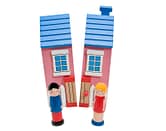 Awhile back I had a phone conversation with a potential client, “Mary”, that I’ll never forget. “Jody”, a close friend of Mary’s, had completed the “Between Men and Women” Couples Wellness Weekend a few weeks previous. Jody recommended it to Mary because she knew the problems Mary and her husband had been having over their 20 year marriage were getting more serious. I saw what “Between Men and Women” had done for Jody, and I explained to Mary that I knew the program would help get her marriage back on track. In the end Mary decided not to register despite Jody’s recommendation. Why? Because in Mary’s words, “Our marriage isn’t as bad as Jody’s yet.” It wasn’t painful enough yet.
Awhile back I had a phone conversation with a potential client, “Mary”, that I’ll never forget. “Jody”, a close friend of Mary’s, had completed the “Between Men and Women” Couples Wellness Weekend a few weeks previous. Jody recommended it to Mary because she knew the problems Mary and her husband had been having over their 20 year marriage were getting more serious. I saw what “Between Men and Women” had done for Jody, and I explained to Mary that I knew the program would help get her marriage back on track. In the end Mary decided not to register despite Jody’s recommendation. Why? Because in Mary’s words, “Our marriage isn’t as bad as Jody’s yet.” It wasn’t painful enough yet.
Why do people wait until it’s bad enough…often until they are on the verge of divorce…before they act to make things better? This habit, if you will, of waiting until it’s bad enough in relationship before acting to make things better has real consequences for you:
- A lot of life is wasted in the slow erosion toward the bottom. Imagine all the years of feeling good that you miss out on.
- Once hitting the bottom it takes exponentially more energy just getting back to good, let alone achieving “great”.
- When we’ve lived in “bad” long enough, good is pretty appealing. In our relief, we settle for it. We don’t go for great, either because it seems too hard…too distant…or we can’t even conceptualize how it would look so we don’t even try.
“Learned Helplessness” Holds Us Back
So what has us wait until it’s bad enough before we act to save our relationships and improve the quality of our lives?
Some research points to a behavioral response called “learned helplessness”. Now, we are not psychologists, but this makes sense to us. During studies, researchers subjected rats to repeated stressful situations from which the rats had no chance of escaping. The rats eventually stopped trying to escape despite their ongoing discomfort. On the other hand, a control group of rats that had not experienced the same repeated failure because they were allowed to find a way out did not give up and successfully escaped the discomfort.
In other words, learned helplessness develops when we feel trapped in uncomfortable circumstances and have failed to fix the situation despite repeated attempts. It’s a learned response based on past observation. We accept the hurt because we feel we have no control and we don’t know what to do. We start settling.
The Gender Connection – Why Men and Women Settle for “Bad” in Relationship.
Why do people settle? Remember, men are all about production and are guided by the likelihood that they will win or lose in a given circumstance. With repeated failure in relationship, they feel a loss of control and efficacy. The  likelihood of a win seems increasingly remote. They settle for what they have – boredom, anger, frustration, or whatever – because that seems preferable to the “inevitable” loss in trying to fix things yet again. The win is in not losing again.
likelihood of a win seems increasingly remote. They settle for what they have – boredom, anger, frustration, or whatever – because that seems preferable to the “inevitable” loss in trying to fix things yet again. The win is in not losing again.
For their part, women are desire. They want a lot of things and they feel a deep disappointment when they express what they want…for example, travel, romance, things done around the house, intimacy, amongst others… and repeatedly don’t get it. It’s even worse when women are criticized by their partner for wanting those things in the first place (criticism can look like rolling eyes, sarcasm, insults, getting mad, etc.). If women repeatedly meet with that sort of response they won’t feel safe asking for anything and will eventually shut down. Their light goes out. Nothing is more sad to watch.
It’s Not Just About Relationship…Settling Can Affect Your Health
As mentioned above, researchers found that when rats repeatedly failed to escape stressful circumstances they stopped trying to escape. Further research found that giving into circumstances had a cost. Researchers found that the rats that stopped trying to escape were more prone to cancerous tumours than the group of rats that were allowed to flee the stressful situation.
Other research found that in humans, learned helplessness contributes to depression, poor interpersonal skills and poor cognitive skills. Psychologists K. Bennett and M. Elliot also found that people more prone to learned helplessness…
…tend to have weakened immune systems and not only have increased vulnerability to minor ailments (e.g. cold, fever) and major illness (e.g. heart attack, cancers), but also have a less effective recovery from health problems. (Basic and Applied Psychology, Vol. 27, 2005)
What’s the “Cure” for Learned Helplessness in Your Relationship?
This is why it is so important for couples to avoid falling into patterns of relating that contribute to resignation, settling and feelings of helplessness. Relationships can feel like traps when they aren’t working.
So what can you do to avoid this trap in your relationship?
Learned helplessness can be reversed when people experience success. So men, when your partner asks for something don’t make her wrong. Do what you can to get it for her. In cases when it’s not possible, such as not being able to afford a holiday right now, at least make some movement in the direction of her desire so she knows you heard her and that you will satisfy that desire when possible. She will be happy, alive and full of energy, which is what you both want.
Ladies, your guy is all about fixing what occurs as “wrong”. If there is nothing for him to fix, and you just want him to listen, tell him that. If there is something for him to do, tell him that too, including how good you will feel when he does that for you. Then, and this is most important of all, thank him and tell him why doing what he did means a lot to you. It will feel good to him. He will keep coming back for the wins which means you both win.
That’s why Donna and I do what we do. We want everyone to win without compromise. Our work empowers men and women with the skills they need to have each other operate at their best, together, all the time. We show you how to avoid having your relationship deteriorate into a “trap” that has you feeling helpless without knowing what to do. There is always an answer when you understand yourself and your partner. Guaranteed…100%.
For the complete blueprint on how to understand and connect with your partner attend the upcoming “Between Men and Women” Couples Relationship Retreat. For details click here:
“Between Men and Women” Couples Relationship Retreat
Get Connected…Feel Connected…Stay Connected
———————-
This blog is for you. We want to stay relevant and useful to your life.
Below this post please leave a comment and tell us what you think the most powerful part of the article was. What did you learn, and what concept or idea that we’ve shared is going to have a huge impact, and why?
Please post a comment below because we read them all personally, and we love seeing that you are enjoying our training, and that you’re getting good value. To Your Greatness!
